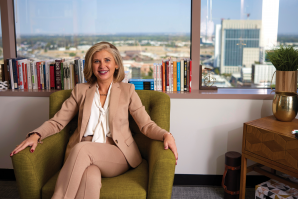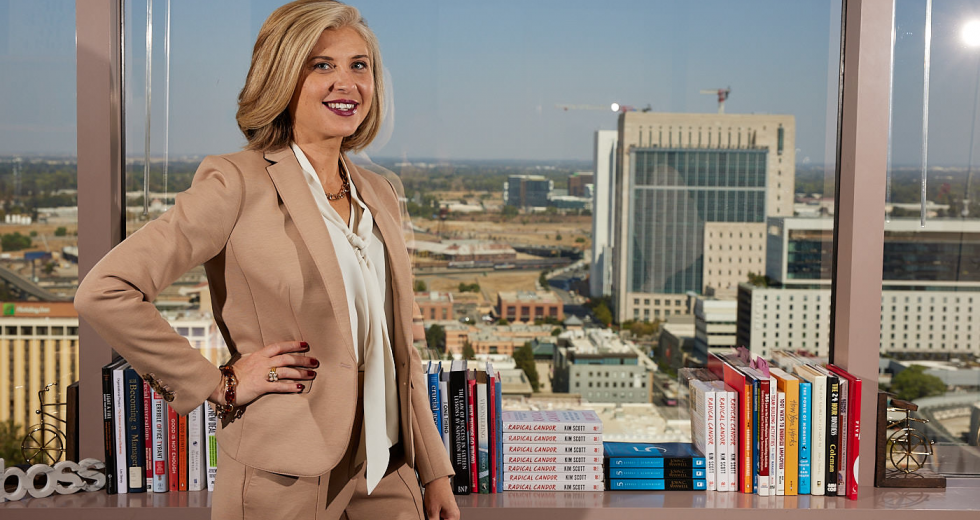Amanda Blackwood changes the location of the interview three times before deciding to get away from her formal office of the Sacramento Metropolitan Chamber of Commerce on Capitol Mall to the cozy comfort of Old Soul Weatherstone coffee house — which happens to be where she filled out the application for the chamber job. Despite my getting there early, Blackwood is already there holding court on the back patio when I arrive. She is unmistakable with her blonde hair waving as she animatedly talks in what I’ve dubbed Nancy Pelosi hands. Blackwood swings around with a smile and introduces me to Tiffany Frazier, whose Street Soccer Sacramento had a tremendous achievement this past summer by hosting the World Cup of Street Soccer in our city.
Blackwood broke barriers at the chamber, becoming the youngest president at 35 and the first full-time female president. She served during one of the most tumultuous times in the chamber’s history: Her team navigated hundreds of small businesses in a six-county region through the COVID-19 pandemic, often working 12-hour days helping them stay afloat and obtain PPE loans while acting as therapists to the worried owners. She also guided businesses through the turbulence of the George Floyd protests in the summer of 2020, when several downtown Sacramento businesses were vandalized. But she was able to bring in $100 million in economic impact for the Capital Region and get the chamber’s boards to be 50 percent female, something she’s especially proud of.
The outspoken Blackwood has never shied away from controversy. She has been one of the most outspoken critics of the homeless problem in downtown Sacramento and a major supporter of Measure O, also known as the Emergency Shelter Act of 2022.
With her time at Sac Metro now over, Blackwood has joined the consulting firm of I Street Public Affairs, a bipartisan public affairs group, as a partner. She is also owner and managing partner of Sacramento-based OE Consulting Group, which works with businesses and nonprofit groups on talent management and business process changes. Before OE, she had roles as chief development officer for Elevation Entertainment Group and as chief financial officer for Folsom Asset Management Inc. The mother of two young daughters, Avery and Parker, she is married to Steve Blackwood, assistant principal of Will C. Wood Middle School.
In November, Robert W. Heidt Jr., head of the Glendale, Arizona Chamber of Commerce, was announced as Blackwood’s successor. He starts in January. Here are some of Blackwood’s thoughts about her nearly six years in office.
How growing up in Kansas shaped her:
In Kansas, if you have a job, you can get your driver’s license when you are 13. So it was one of those kinds of tickets for freedom to do all that. I have always worked, 13 on, because it was associated with freedom, and then ultimately, make your own money, you can make your own choices.
I always had my own business. My parents had small businesses. My dad preferred corporate, but they flipped houses, they always sold some kinds of things. So I think that was kind of the culture of our household. But I also liked leadership programs, things like that when I was a kid, and my parents really supported it and thought it was a good thing to do.
On her turbulent tenure during the pandemic and the George Floyd protests:
Complex, complex, complex. How do we navigate it? Start with empathy and understanding for those that are experiencing what they’re experiencing, all the way around. … We had small businesses and large businesses and people trying to navigate it. They had no awareness as to where that anger could come from, particularly the Sacramento story of our Black community and our neighborhoods feeling lied to, and feeling how they felt. It was a huge opportunity for us to step in on education, like, let’s not create stories about each other, let’s not vilify each other, here’s just some basic understanding so that we can have a conversation.
At the same time, I’m an advocate for business. There was no instance in any time, at any place, that it’s appropriate to rob a business, to come in and vandalize a business out of your anger. To hold both things wasn’t easy. We can create understanding around it, and no one is the villain. So let’s try to channel as much energy as we can into moving forward in a healing way, but holding people accountable when they do things that are imperfect. …
Our team worked. It was a triage, like Red Cross — business Red Cross. It was whatever someone needed. So it started with just basic access to equipment. Remember back then, you couldn’t get masks, you couldn’t get hand sanitizer, you couldn’t get anything.
We sat outside grocery stores with boxes and masks and told businesses to come and pick it up so they could be open. And then it became the PPE (business loans). And that was nonstop just to get people through that, which became just really interesting. The calls we started getting were coming from all over the state, and then they started being all over the country. So our hotline really blew up. It was the place to get advice. But the content was getting real heavy. And we ended up having to take all of our staff and put them through suicide prevention training to take these phone calls because it was like, “I’ve lied to my family. I’m out of money. I don’t know what to do.” People (at the chamber) were just the lifeline.
On the decline and possible recovery of downtown:
There’s a lot of things we don’t know. But what we do know is we will have a future. … So downtown, its chance of hope and success, by default, are probably very low. …
You’ve got to get innovative, and it’s got to be short, midterm, long term. How do you activate space through pop ups and retail and activation while you’re waiting? But some kind of “Let’s pray to the state gods that they are going to somehow miraculously turn 1940 office buildings into urban infill housing” is not a plan. That is not a promise. What you can do is get really, really aggressive with just a single moratorium for a period of time … and open that up to private business. And I think you can find a solution.
Challenging the city to do something about the homeless problem:
It was a moral issue. This is a huge crisis, and everyone is blaming everyone else. Yes, it’s a business issue. It’s not great for business, not great for public safety. It’s not great for perception or optics. We were dealing with an actual moment in time where literally no elected official, no appointed official was taking responsibility for actually sheltering human beings that are having a mental health breakdown. No one’s doing anything about it. Of course, we want enforcement, and we want to be clean and safe. Of course, we want that. But more than anything, build the shelters, like just get to it. We have a humanitarian issue, and no one’s doing anything.
(Prop. O) is the only piece of legislation that requires mental health and mental health services, expanded capacity and the enforcement of our basic laws.
Finding time for family and personal interests again:
I love, love my boards. I’m on St. John’s (Program for Real Change) board and Street Soccer USA. And I love that. … With this transition, I’ve been able to spend a lot more time with my kids. I’ve been the drop off parent; I’ve never been able to pick them up from school. I have a 12- and a 9-year-old — seventh grade, fourth grade. So I get to pick them up from school.
I very much subscribe to the philosophy you become the five people you’re hanging out with. It normalizes your world. So I’m really intentional about what people I want to be around so that I can see what’s possible. What fills my bucket is spending quality time with people that I care about and that I respect. I love to cook and spend time with friends. …
My husband and I, it’s fun to tell people we’ve been together 24 years. We had a rough go last year. So it’s been a very good place to, every Thursday, I do mental health stuff in the morning, and I go see my therapist, and we work on our marriage, and I make a lot of intentional time. Mental health is important and is a practice, and I think it’s really important to normalize what a lot of high intensity people really need. Therapy is a really important thing. And it’s not just a business coach. This is mental well-being.
This is all new. These are things I never did before. I create much more time for family and myself slowing down. I still work 12 hours. But I get up at 5:30. And I do my stuff in the morning, and then I’m present for school.
Proudest achievements as CEO of the chamber:
I’m so, so proud. In 2022, Metro Chamber, it’s our highest grossing revenue year, in at least the last 50 years. We won our races. Our boards are now 50 percent women. And our PAC (political action committee) board never happened before. … We’ve had over $100 million in economic impact. A very small group of people can do an incredible amount when they believe they can or had to do it.
New challenges ahead:
What I learned I think the most in my last two years at the chamber was how critically important people in elected office are. And it doesn’t matter the plans and the strategy. … If you don’t have the right people in the right seats, nothing gets done. So what I am very excited about as I move into the future, and in my own practice, is taking a very firm leadership role in the state of California and ensuring that moderate, reasonable, practical people that want to represent the people of California get a chance to get into office.
California is a place of incredible, incredible abundance. We have more money than we know what to do with. But if you don’t have the right people in the right seats, they don’t make the local decisions or make the state decisions. So I am going to devote a significant amount of my practice to building the new bench and ensuring that people that want to lead for the right reason.
It’s really important that we create space for minority candidates and women candidates to even have a chance.
No more is the world of those that have are going to decide how everyone else needs to live. Whether you like it or not, it is a place where people are going to speak for what they want, and government has to be adapted to that. So I think that’s fascinating.
What gets her excited:
I think that’s really what I’m also excited about is from a legislative standpoint, from a policymaking standpoint. I love working on campaigns, being able to really create a difference, putting some numbers on the 2024 state ballot that’s really going to provide mental health to the people of California, getting things passed that really change housing, working with the governor’s office on things that really matter. Working with like-minded groups that it’s not about partisan, it’s not about divisiveness, it’s just about getting it done for the betterment of people in California.
I am obsessed with voter analytics and ChatGPT and AI. I think that the traditional way that we run campaigns, both individuals and initiatives, is based on data, is based on polling. But that is only a part of it. Because we now have the ability to see social chatter and how people are feeling and what voter sentiment is.
This is my contention and hypothesis. I think through basic analytics, basic tracking of local communication, you can create a mean — an average for any community on a couple of key issues. You could then use AI to continuously monitor social chatter, Comstock’s comments, Sac Bee comments, Reddit threads for Sacramento. And you would see when things are ratcheting up on any given issue, be it rent control, whatever. That would just alert you that you are now starting to move standard deviations from the mean. So community sentiment must be changing in some kind of way.
I’m very conscientious of how power is held. And I feel very, very strongly that when you are in a position of hierarchical power, you have a great responsibility for those that don’t. So when it comes to things like mayor and council, any elected official, we can be friends all day long. We can hash it out, we can grab a beer, we’ve got a barbecue, but you took a seat. And you are the representative voice of all of the people who don’t have a voice. And there’s nothing that is more important to the core of your integrity than doing the thing that you said you were going to do.
The lesson she learned that she wants to share with others:
This is my hope and dream if somebody reads this. If you have an “on the fence” feeling like, should I do something? Should I take a risk? They should feel like, shit yeah! Like, she did it! I could do it. That’s what I would hope.
Editor’s note: Shortened for length and clarity. Sacramento attorney Martha Lofgren was the first woman to serve as head of the Sac Chamber on an interim basis.
–
Stay up to date on art and culture in the Capital Region: Subscribe to the Comstock’s newsletter today.
Recommended For You

Women in Leadership: Marisa Sharkey
Our annual salute to extraordinary women breaking barriers and rising to the top
Before starting her shoe company Birdies, Marisa Sharkey
described herself as risk averse. Eight years in, her bold moves
have paid off.

Getting to Know: Cole Cuchna
Podcast host makes a career out of analyzing the biggest albums in hip-hop
With “Dissect,” Cole Cuchna goes deep into his favorite
music albums, cultivating curiosity in others. Now nine
seasons in, he’s found success with a Spotify partnership
and a talk at TEDxBerkeley.

Getting to Know: Faith J. McKinnie
Gallerist Faith J. McKinnie is highlighting the work she wants to
see in her Midtown gallery that highlights contemporary art
by underrepresented artists.

Where Have All Our Leaders Gone?
In a divided country, some local leaders are serving with integrity
Across the political spectrum, this is perhaps the only thing
that everyone can agree on: The nation lacks inspiring leaders.
While leadership appears to be lacking on the national stage,
quietly — away from the spotlight — local leaders can
inspire.

Stolen Business
Sacramento-area businesses grapple with retail theft
Vanessa Van Vleck keeps a wall of shame at Superbum Plant Company, identifying people suspected of stealing from her East Sacramento store. It’s one of the few things Van Vleck and her husband, Dylan Van Vleck, who opened their business in 2021, can do to deal with a burgeoning problem in California.



